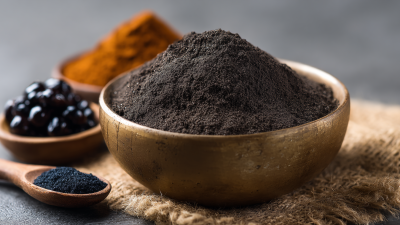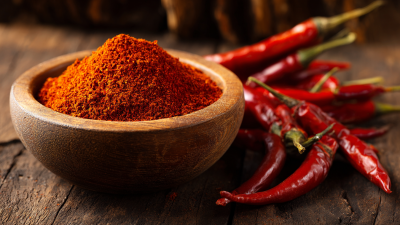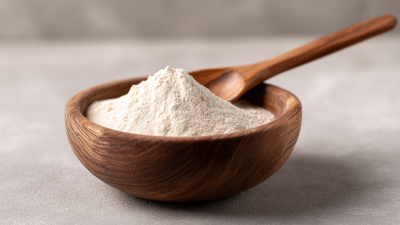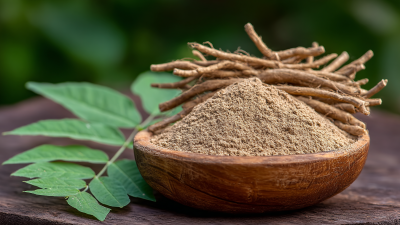In recent years, the demand for Bulk Kaempferol Powder has surged due to its numerous health benefits and applications in various industries, from dietary supplements to cosmetics. As more businesses aim to incorporate this powerful flavonoid into their product offerings, several common sourcing challenges have emerged. These challenges can encompass issues related to quality consistency, supplier reliability, and compliance with regulatory standards. In this blog, we will explore these critical aspects of sourcing Bulk Kaempferol Powder, providing insights and strategies to navigate the complexities of the supply chain. By addressing these common issues, businesses can not only ensure the efficacy and safety of their products but also position themselves favorably in an increasingly competitive market. Join us as we delve into the essential considerations and future trends surrounding Bulk Kaempferol Powder sourcing.

When sourcing bulk kaempferol powder, several key factors can significantly influence its quality. Firstly, the source of the raw material is crucial. Kaempferol is primarily derived from various plants, including kale, spinach, and tea leaves. The geographical location and climatic conditions where these plants are grown play an essential role in determining the flavonoid concentration. Suppliers who cultivate their plants in optimal conditions tend to produce higher-quality kaempferol, rich in active compounds.

Another important aspect to consider is the extraction and processing methods used to obtain kaempferol powder. Different extraction techniques can yield varying purities and bioavailability of the final product. Methods that utilize gentle solvents or aim to retain the plant’s natural properties are often preferred over those involving harsh chemicals. Additionally, thorough testing for contaminants and potency should be a standard practice among suppliers to ensure that the bulk powder meets industry quality standards and is safe for consumption. Consumers should therefore prioritize suppliers who are transparent about their sourcing and testing processes.
When it comes to sourcing bulk kaempferol powder, understanding how to evaluate different suppliers is crucial for ensuring product quality and efficacy. Start by assessing the supplier's reputation in the market. Look for those that have established themselves with positive reviews and testimonials from previous clients. Engage directly with suppliers to inquire about their sourcing practices, extraction methods, and certifications. This proactive approach helps ascertain whether they adhere to industry standards and regulatory requirements.
Comparing product specifications is another key factor in choosing the right supplier. Evaluate the purity levels and concentration of kaempferol, as these metrics directly impact the powder's effectiveness. Request detailed product datasheets and lab analysis reports to gauge the quality. Additionally, consider the pricing structures; a lower price doesn’t always equate to inferior quality, but it should raise flags if it’s significantly lower than average. Ultimately, a meticulous comparison will help in sourcing kaempferol powder that meets your specific needs while ensuring you partner with trustworthy suppliers.
When sourcing bulk kaempferol powder, understanding the importance of purity and potency is crucial. Kaempferol, a naturally occurring flavonoid found in various plants, is widely recognized for its antioxidant and anti-inflammatory properties. According to a report by the Pharmacopeial Forum, the efficacy of kaempferol is closely linked to its purity levels, with variations in contaminants leading to inconsistencies in bioactivity. This makes the sourcing process vital for manufacturers looking to produce high-quality health supplements.
Tips for ensuring high purity when sourcing kaempferol powder include requesting comprehensive certificates of analysis (COA) from suppliers. These documents should detail the purity percentage, potential contaminants, and testing methodologies used. Additionally, seeking suppliers who comply with Good Manufacturing Practices (GMP) can help in confirming that the kaempferol powder is handled and processed correctly to maintain its potency.
Another important aspect is to consider the source of the kaempferol. Research indicates that kaempferol extracted from certain plants, such as kale and ginkgo, tends to have higher bioavailability than others. Therefore, it's beneficial to choose bulk suppliers who provide extract information and traceability, ensuring you receive a product that not only meets purity standards but also offers enhanced potency for therapeutic benefits.
| Supplier | Purity (%) | Potency (mg/g) | Source | Certification |
|---|---|---|---|---|
| Supplier A | 95% | 500 mg/g | Natural | ISO 9001 |
| Supplier B | 98% | 600 mg/g | Synthetic | GMP |
| Supplier C | 97% | 550 mg/g | Natural | ISO 22000 |
| Supplier D | 90% | 480 mg/g | Organic | HACCP |
| Supplier E | 99% | 700 mg/g | Natural | FSSC 22000 |
 When sourcing bulk kaempferol powder, it's crucial to strike a balance between cost and quality to ensure smart investment choices. Kaempferol, a potent flavonoid with numerous health benefits, can vary significantly in price, and understanding the factors that influence these costs can help buyers make informed decisions. While cheaper options may seem appealing, they often compromise on purity and potency, which can lead to subpar results in applications ranging from dietary supplements to cosmetic products.
When sourcing bulk kaempferol powder, it's crucial to strike a balance between cost and quality to ensure smart investment choices. Kaempferol, a potent flavonoid with numerous health benefits, can vary significantly in price, and understanding the factors that influence these costs can help buyers make informed decisions. While cheaper options may seem appealing, they often compromise on purity and potency, which can lead to subpar results in applications ranging from dietary supplements to cosmetic products.
Tip: Always request a Certificate of Analysis (COA) from your supplier. This document provides essential information about the product's quality, including its active ingredient levels and any contaminants. It serves as a safeguard to verify that you're investing in a genuine, high-quality kaempferol powder.
It's also wise to compare multiple suppliers and analyze their pricing structures in relation to the quality of their products. Suppliers who invest in sustainable sourcing and rigorous testing typically command higher prices, but they also deliver superior quality.
Tip: Look for customer reviews and testimonials that speak to the efficacy of the kaempferol powder. Real-world feedback can provide valuable insights into product performance, helping you gauge whether the investment will yield the desired results.
When sourcing bulk kaempferol powder, sustainability and ethical practices have become paramount considerations for many businesses. The demand for natural products has increased focus on how these ingredients are obtained, emphasizing the importance of transparent supply chains. Ethical sourcing not only considers the extraction methods but also the impact on local communities and ecosystems. Companies must ensure that their kaempferol is sourced from suppliers who prioritize sustainable farming practices, minimizing environmental degradation and fostering biodiversity.

Additionally, the social responsibility of sourcing practices cannot be overlooked. Businesses are encouraged to engage with suppliers that uphold fair labor practices and support the livelihoods of local farmers. By investing in ethical sourcing, companies can cultivate a positive brand image and build trust with environmentally-conscious consumers. Integrating sustainability into sourcing practices not only mitigates the risk of resource depletion but also aligns with the growing trend of consumer demand for eco-friendly products.
As the market for kaempferol powder continues to evolve, prioritizing ethical considerations in sourcing will be crucial for long-term success and impact in the industry.






